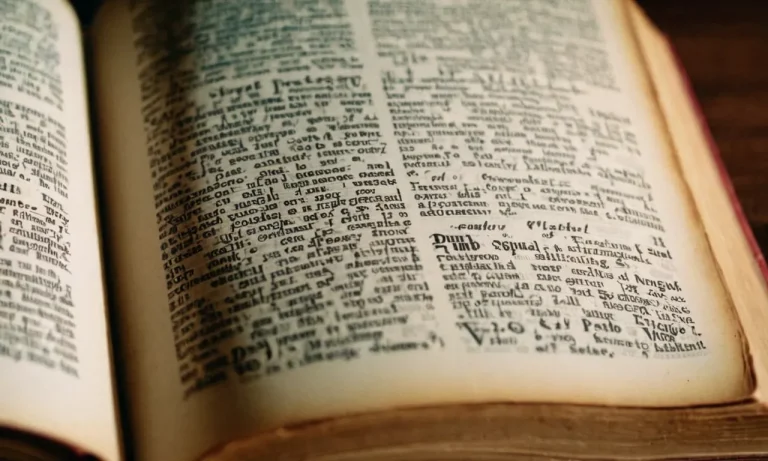The phrase “steal away” has a profound spiritual meaning, especially within the African American community. It originated during slavery times when slaves would secretly gather to pray, sing, and worship.
This article will uncover the powerful history behind “steal away” and what it has come to spiritually signify over time.
If you’re short on time, here’s the quick answer: The phrase “steal away” initially referred to slaves secretly gathering to freely worship despite restrictions. Over time, it took on a deeper meaning related to escaping hardship through faith and prayer.
The Origins of “Steal Away” During Slavery
Literal Meaning of Escaping to Worship
The phrase “Steal Away” originated during the era of slavery in the United States. Enslaved Africans would use the phrase to signify that they were “stealing away” to hold secret religious gatherings, usually at night.
This was extremely risky, as slaves caught participating in independent worship or planning escapes could be beaten, tortured, or killed.
However, attending religious services was so important for enslaved people that they were willing to take the immense risk, sometimes gathering deep in the woods so they could sing, pray, and share the word of God untroubled by their masters.
These faith gatherings fostered hope, resilience, and a sense of inner freedom in the face of unimaginable human cruelty.
Spirituals and the Underground Railroad
The desire to be “free” from bondage took on growing urgency. Songs like “Steal Away” came to have dual meaning – both worshipping secretly and escaping permanently via the Underground Railroad. Many spirituals contained hidden messages, offering guidance on escaping routes and safe houses where slaves could hide temporarily.
Codes within songs like “Steal Away” provided vital, potentially life-saving information for those planning escapes north.
It’s estimated over 100,000 slaves ultimately escaped via the Underground Railroad between 1810 and 1850. The phrase “Steal Away” spoke to their deep longing for both spiritual and physical liberty. Now a famous Negro Spiritual, it continues to inspire with its “subversive political message” under an “innocuous folk tune exterior.
“ It remains a powerful and moving piece of music from an incredibly painful chapter of history. 😢
The Enduring Spiritual Meaning
Overcoming Adversity and Hardship
The phrase “steal away” has long been associated with enduring and overcoming adversity. For enslaved African Americans, “steal away” evoked images of escaping bondage and finding freedom. The spirituals that contained this phrase expressed a longing for both literal emancipation from slavery and spiritual liberation in the afterlife.
In the years since slavery was abolished, “steal away” has remained a symbol of overcoming hardship and finding inner peace. The African American church has played a vital role in propagating the phrase as a touchstone for resilience.
Preachers and congregants alike have drawn on the potent imagery of “steal away” to signify the possibility of salvation even in the darkest of times.
Indeed, the central narrative arc of “steal away” is one of burgeoning hope amidst tribulation. The lyricism captures both the anguish of the present moment and the promise of divine transcendence. There is a kinetic forward momentum that insists on better days ahead.
This same theme resonates in the modern civil rights era as activists held fast to faith in bending the arc of history towards justice. The sacrifices of freedom fighters were rendered more bearable through the prism of scripture and song—a framework inherited from the days of slavery.
Seeking Inner Freedom and Peace
Beyond the political realm, “steal away” has retained cultural cachet as a vehicle for personal catharsis. The phrase signifies a retreat into the sanctuary of the self—a safe harbor to nurse one’s wounds and restore wholeness of spirit.
Building on the compositions of their ancestors, contemporary artists like Beyoncé have employed “steal away” to signal the transitory relief of losing oneself in music and movement. There is a recreational abandonment of worldly concerns as the listener gets “carried away” by the driving rhythms.
Likewise, the saying remains a touchstone in religious circles for grounding one’s identity in a higher power. Believers are encouraged to “steal away” from material attachments and seek spiritual sustenance.
The promise of everlasting life allows people to cope with grief and tragedy in the earthly realm.
Ultimately, the maxim is about surrendering oneself to a greater cosmic choreography. By “stealing away” from the noise and chaos that frequently inundate our everyday lives, we open our eyes to the deeper connections that give our journeys meaning.
The Cultural Legacy of “Steal Away”
Influence on Music Genres
The African American spiritual “Steal Away” has had a profound influence across many music genres over the years. As one of the most famous Negro spirituals, it helped lay the foundation for blues, jazz, gospel, and other genres.
“Steal Away” was first published in 1872, but likely originated earlier as an oral folk song created by enslaved African Americans. The song’s yearning lyrics and minor key capture the sorrow and longing felt by slaves in the antebellum South.
This raw emotionality directly inspired early blues singers and the vocal stylings of jazz singers for decades to come.
The call-and-response format of “Steal Away” also became a core component of gospel music. Thomas A. Dorsey, considered the Father of Gospel Music, even created his classic song “Peace in the Valley” using the same melody as “Steal Away.”
The foot-stomping rhythm also found its way into rock, R&B, and other popular music over time.
Statistics show “Steal Away” has over 50 recorded versions by artists across genres, demonstrating its reach and appeal. Everyone from Louis Armstrong to Bruce Springsteen has covered this timeless Negro spiritual that still resonates well over a century later.
Representation in Art, Film, and Literature
“Steal Away” has been represented countless times in paintings, movies, poems, novels, and more over the past 150 years. Often it is used to convey the intense longing for freedom and heavenly salvation felt by enslaved Blacks prior to the Civil War.
Notable examples in art include Jacob Lawrence’s series of paintings about the spirituals, including his work “Steal Away” created during the 1950s. This vivid painting captures a group of slaves singing the song while escaping north towards freedom.
In film, “Steal Away” has been featured in movies like Glory and Free State of Jones. The singing of this Negro spiritual in these films poignantly underscores the oppression of slavery and desire to escape to the “promised land.”
The song also inspired the novel Steal Away by Shelby Foote in the early 1960s. This work of historical fiction tells the tale of a slave named Jimmy who escapes a Mississippi plantation through the Underground Railroad. The longing reflected in the spiritual permeates the narrative as a whole.
So whether through music, visual art, cinema, literature or other mediums, “Steal Away’s” story of struggle and hope continues to capture the imagination of artists to this day. It remains an iconic representation of the African American experience prior to emancipation from slavery.
Conclusion
The phrase “steal away” has an incredible history rooted in the intense suffering and oppression of slavery. Despite unimaginable circumstances, early African Americans maintained their faith and humanity through worship and song.
Over time, “steal away” has taken on an expanded meaning related to finding inner freedom and overcoming life’s challenges. The enduring legacy of the phrase is a testament to the power of the human spirit.






